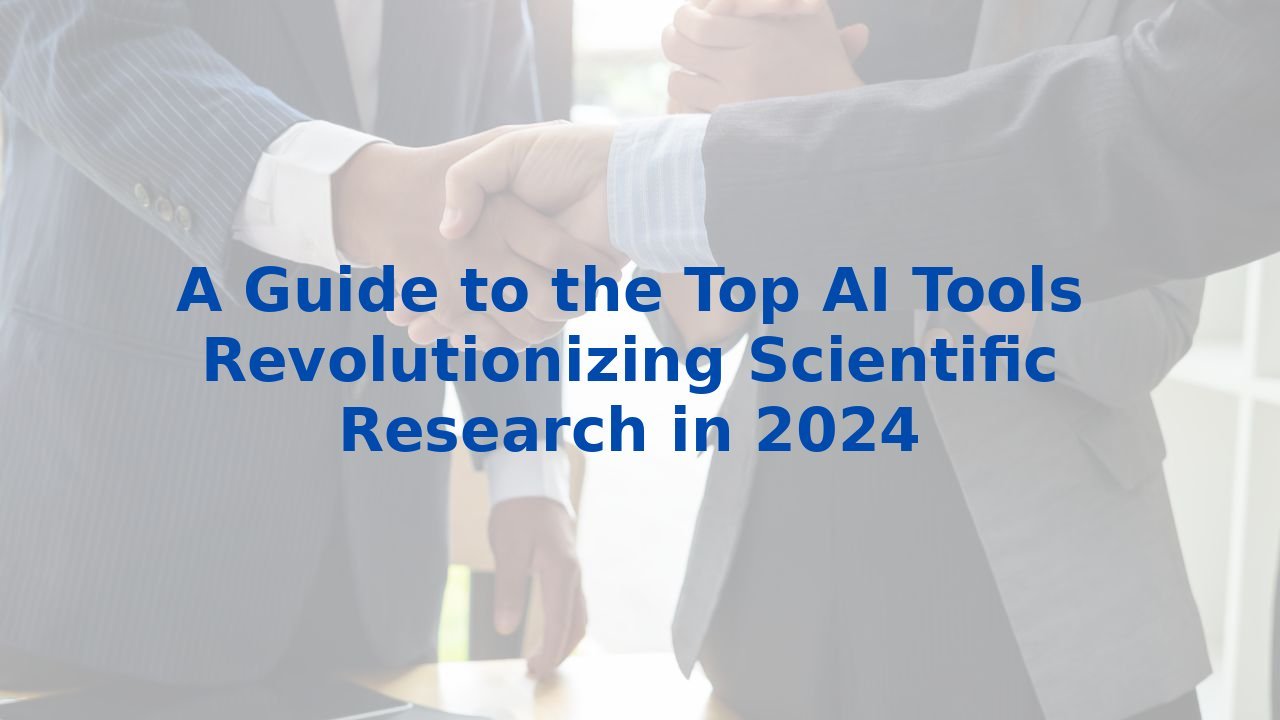A Guide to the Top AI Tools Revolutionizing Scientific Research in 2024
A Guide to the Top AI Tools Revolutionizing Scientific Research in 2024
In the dynamic arena of scientific research, the advent of AI tools marks a transformative shift toward greater efficiency and productivity. As researchers confront the rising complexity of data and information, adopting these innovative solutions is no longer optional; it is imperative. This guide explores how AI tools streamline literature reviews, enhance data analysis, and facilitate collaboration, fostering an environment where researchers can thrive.
Enhancing Literature Reviews
Conducting a traditional literature review can quickly become an arduous and labor-intensive task, often consuming valuable time and resources. However, AI-driven tools have reshaped this landscape, allowing researchers to navigate the vast sea of published work with ease and accuracy.
Semantic Scholar utilizes sophisticated algorithms to glean the deeper meaning behind search queries, delivering nuanced results that match researchers' specific needs. The tool does not stop at merely providing results; it generates concise summaries, pinpointing significant findings and elucidating the influence of the papers based on citation metrics. Such efficiencies empower researchers to focus on the implications rather than getting lost in the details.
Scite.ai takes this a step further with its "Smart Citations" feature, presenting a unique perspective on the body of research. By showing how many studies support or refute particular claims, it equips researchers with crucial context around existing work. This capability enables an informed understanding of the scholarly landscape, thereby fostering more robust analyses and discussions.
ResearchRabbit offers an innovative way to visualize related research. By mapping connections from a seed article, it provides insights into where specific papers fit within the broader academic dialogue. Additionally, its collaborative features promote teamwork, enabling researchers to share insights seamlessly.
Automating Data Analysis
Beyond literature reviews, AI tools deliver significant advantages in data analysis, automating intricate tasks that once required substantial manual effort. This automation not only saves time but also allows researchers to reallocate their focus to interpretation and critical thinking.
Iris.ai can analyze a research paper or project description, suggesting relevant literature while identifying key concepts. This comprehensive understanding aids in both summarization and exploration of research fields, revealing gaps and avenues for future investigation.
Elicit leads the charge in facilitating systematic reviews by constructing literature matrices that juxtapose research aspects across multiple papers. Users can customize search results with specific queries, streamlining the extraction of vital information and sharpening the focus of their investigations.
Facilitating Collaboration
Collaboration is a cornerstone of successful scientific discovery, and AI tools are at the forefront of facilitating this vital process. By managing and sharing data cohesively, these tools enhance the collective efforts of research teams.
ResearchRabbit not only provides visualization but also boasts collaborative capabilities that allow researchers to pool their findings and recommendations. This level of interconnectivity fosters an environment of shared knowledge and growth.
NextNet further enriches collaboration by delivering personalized news feeds and alerts. Researchers can remain updated on emerging trends and publications within their specific fields, helping them maintain a competitive edge and ensuring that their work is always informed by the latest developments.
The Benefits of AI in Research
The integration of AI into scientific research is nothing short of revolutionary, offering myriad benefits:
- Improved Efficiency: By automating repetitive tasks, AI tools free researchers from mundane chores, thereby enabling them to focus on the nuances of their work.
- Enhanced Accuracy: AI excels at processing vast datasets expeditiously and with formidable precision, reducing human error and bolstering research reliability.
- Increased Productivity: The ability to streamline literature reviews and data analysis means researchers can gather information more quickly and effectively, significantly amplifying their productivity.
Training Employees for AI
To maximize the benefits of AI, organizations must prioritize training programs that empower researchers to harness these tools effectively. Understanding the capabilities and limitations of AI is crucial for seamless integration into the research workflow.
Moreover, the fusion of AI insights with human critical thinking remains vital. Researchers should be trained to evaluate the impact of research claims while leveraging AI's analytical prowess. Organizations can cultivate a workforce adept in AI tools, ensuring their research processes become more agile, innovative, and impactful.
Conclusion
The rise of AI in scientific research is not merely a trend; it represents a profound evolution in how we approach inquiry and discovery. The strategic integration of AI tools allows researchers to streamline processes, enhance their analytic capacity, and collaborate more effectively. By staying informed and trained on the latest AI advancements, researchers can ensure their work not only meets but exceeds the expectations of an ever-evolving landscape.
To fully realize the potential of these cutting-edge tools and empower your team effectively, consider exploring comprehensive training programs that equip your workforce with the necessary AI skills to thrive in this new era of research.



